- Home
- Colleen Oakes
The Black Coats
The Black Coats Read online
Dedication
For Katie,
who rises
Epigraph
Revenge, at first though sweet,
Bitter ere long back on itself recoils.
—John Milton, Paradise Lost
Contents
Cover
Title Page
Dedication
Epigraph
Prologue
Part One
One
Two
Three
Four
Five
Six
Seven
Eight
Nine
Ten
Eleven
Twelve
Thirteen
Fourteen
Fifteen
Sixteen
Part Two
Seventeen
Eighteen
Nineteen
Twenty
Twenty-One
Twenty-Two
Twenty-Three
Twenty-Four
Twenty-Five
Twenty-Six
Twenty-Seven
Twenty-Eight
Twenty-Nine
Thirty
Thirty-One
Thirty-Two
Epilogue
Acknowledgments
A Note from the Author
Resources
About the Author
Books by Colleen Oakes
Back Ad
Copyright
About the Publisher
Prologue
Grapeland, Texas. 1972.
Robin Peterson always knew when there were football games. Her parents’ brick house stood across from the school, where only a field of wildflowers separated her front yard from the lights and the noise of Grapeland High. On Friday nights, she could hear the chants of the cheerleaders from her bedroom window.
“Are you ready?”
No.
“I said, are you ready?”
Still no.
Robin would play her music loudly to drown out the noise, but that accompanying sound track of Texas life always filtered through—the stomps of the crowd vibrating down from the stands, the smell of burnt hot dogs wrinkling her nose. She stared defensively back toward the school as the melodic strains of “Man in Black” by Johnny Cash spun on the record player.
As soon as she graduated, Robin would be gone. She would leave the jocks and the cheerleaders in a swirl of dust as she wove her way across the country, song by song, until she reached the West Coast.
Tonight, though, she didn’t mind all the noise that carried across the field because Robin was going to meet a boy after the game. His name was Trevor Hitch, and he happened to be the cutest boy she’d ever seen. His confident green eyes had sucked her in like a black hole when he asked to borrow her geometry notes yesterday. She had stammered, “Yes, yes, of course,” and he had arranged for them to meet after the game, in the field behind the stadium. That same dry patch of land that eventually ended up in her front yard.
He had no idea where she lived, had no idea she could just walk out of her house and be there. Maybe, Robin dared to hope, that could change. Trevor was the kind of boy who was a mystery to her: popular, lighthearted—a boy who could slyly wink and get away with it. Perhaps they would become friends. Perhaps he will be my first kiss.
The roar of the crowd peaked and finally receded. The team had lost again. The bright, blazing stadium lights went out a few minutes later, plunging the lot into darkness. Robin took a deep breath and shrugged on her father’s black wool peacoat—completely unfashionable, but hip in a rock-and-roll way—and after debating it for a few seconds, decided to run a brush through her hair and put on a spot of Pure Magic Lip Gloss. Just a little bit. She mouthed words to herself in the mirror.
“Oh, hey, Trevor! Here are the notes. Deep Purple? Hell yes, I love them.”
She paused a second before lifting the needle from her record player, letting Cash’s pure sound wash over her, feeling each lyric cut deeper than the next.
Robin glanced at the clock and left her bedroom, tucking her notes inside the coat pocket. Her parents were watching Johnny Carson as she walked past them to the front door. Her dad, his owl-frame glasses reflecting the light, reached for her hand. “Where are you off to, kid?”
She gave his hand a squeeze. “Just meeting some friends after the game.”
Her dad nodded and turned back to the screen, slapping his leg happily at something Johnny was doing. Her mother chuckled along.
Robin shut the door behind her and looked out across the field to the stadium. The last handful of students were loudly making their way toward the parking lot, no doubt on their way to a barn party.
It was almost a half hour later when she finally saw Trevor’s silhouette making its way across the wild grass. As he approached her, she could see that he was freshly showered and could smell a hint of Ivory soap. Maybe he wanted to look nice for me. Robin’s heart quietly thudded with hope as she approached him.
“Hey! I have the notes.” Just being near him made her dizzy.
“Great.” He regarded her coolly.
She cleared her throat. “Mr. Henson is tough. I remember that from last year.”
“Yeah. He is.” He glanced around them. “Did you bring anyone else with you?”
Robin tilted her head. “No, don’t worry. It’s not a big deal; it’s just notes—”
His fist came so fast that at first she didn’t even know what had hit her, but then it came down again on her face and nose. Trevor? Robin tried to cry out as she tasted blood in her mouth. She was on the ground then, and Trevor was on top of her, pinning her hands down, his breaths heavy. It started happening before she even understood what was happening.
Robin knew she should be trying to fight him off, but the shock was too strong, the shame cutting too deep. She couldn’t get her body to move. Over her own screams, she heard disjointed Cash lyrics playing in her head.
An inhuman cry escaped from her throat as she looked across the field, seeing the flickering of the television through the windows of her house. Her parents were right there, so close and yet . . . Robin closed her eyes as Trevor brought his fist down against her temple, this one sending her spinning mercifully into darkness. The field tilted as her head bounced against the dirt, her thoughts folding one on top of the other.
My first time wasn’t supposed to be this way.
She wasn’t sure how long she was there or when he left, but Robin woke up in the same spot, goldenrods pressed against her face, their sickly sweet stems sticking to her bloody lips. She couldn’t open her right eye, and her left wrist was swelling. Stumbling and sobbing, Robin wrapped her father’s coat around her and instead of walking to her house, limped toward her best friend Julie’s house, a yellow Victorian two blocks down. Only one thought repeated itself in her jumbled mind as she made her way there, step by unsteady step: I can’t tell my father. Not now, not ever. He will never look at me the same again.
Later, Robin wouldn’t remember walking there, or pushing the door open to find Julie Westing sprawled out on the couch, reading. Her friend would take her upstairs and hold her up in the shower. She would wash the blood out of her hair and ice her wounds, her hands shaking with rage. She would call Robin’s parents to say that she fell down the stairs and that she was going to stay with her for a few days. Her best friend would hold Robin through that long, dark night, reassuring her that she was safe now and that they would have their revenge.
And three weeks later, Julie would stand by as Robin pulled on her father’s black coat and, with shaking hands, picked up a baseball bat.
Part One
One
Austin, Texas. Present day.
Thea Solo
man was up to her elbows in clay when someone secretly placed the envelope next to her bag. It was a busy pottery workshop, with almost wall-to-wall bodies in the small art room at Roosevelt High. Thea was at her favorite pottery wheel, the one in the corner, away from everyone. As the clay wove its way up through her long brown fingers—so cold and slimy and lovely—Thea had the distinct feeling that this wheel was made for her. It didn’t ask anything of her. It didn’t want her to talk about Natalie; it didn’t want her to smile. Thea just wanted to pick her glazes in peace (today a cheery yellow semigloss, for the sunshine she couldn’t muster), and then feel the simmering kiln kiss her skin with its hungry heat. A tight curl of brown hair fell over her eyes, and Thea blew it upward. She felt safe here in the back corner, and so she was a bit unnerved when, upon returning from washing her hands, there was a black envelope lying next to her bag.
“What?” Thea picked up the card, looking to see if anyone was watching her. No one was; the teacher was laughing loudly at something human-Barbie-doll Mirabelle Watts had said, and a bunch of boys were giggling in the corner as one carved a penis out of clay. Thea sat down on her stool, turning the envelope over in her hand. The front of it was bare, and on the back there were two letters, visible only when she turned it in the light, a hard script of black gloss on the black envelope: BC.
Thea frowned. Was this a prom invitation? The last thing she wanted was to go to prom. Also, no one wanted to take her, so that worked out great for everybody. She slipped her fingers under the flap and winced when the paper sliced cleanly into her fingertip. She brought her finger to her lips and sucked away the small dot of blood. She pushed open the envelope, the inside flap revealing a gorgeous yellow-gold backdrop covered with a myriad of black images in an Edwardian pattern: black-winged butterflies, a gold scale, splatters of ink that bled into thorny roses and sharp daggers. In the middle was a silhouette of a woman, her chin raised high. It was so beautiful that Thea ran her fingers over the pattern, feeling the soft texture of the black over the gold paper. She pulled on the card inside. Black cardstock slid out, bound with a black lace that covered up embossed gold lettering.
Thea again looked around to see if anyone was watching and then carefully unwrapped the black lace binding. Her breath caught in her throat as she read.
Angel of the Waters.
Ten minutes.
Don’t be late, and don’t share this note with anyone.
Thea’s head jerked back. What is this? Is someone trying to trap me? That couldn’t be right—her high school was far too boring for something like that, and yet . . . worse things happened. Worse things had happened. But unlike her life for the last six months, this was something interesting, something mysterious. Angel of the Waters. Thea thought for a moment. The Bucket. Of course. She paused, her mind cartwheeling. What did she have to lose? Her clay vase was now puttering in a sad circle, neglected and deformed. Thea leaped to her feet and threw her book bag over her shoulder while grabbing the envelope with her other hand. Mrs. Brown followed her out into the hallway. “Thea? Are you all right, dear?”
Thea turned away from her and hid her face, playing the only card she had. “Sorry. I just need to see the counselor.”
Mrs. Brown nodded. “Of course, dear. Go right ahead.”
Once Mrs. Brown returned to her classroom, Thea took off, sprinting down the gray hallway that ran underneath her enormous high school. Poor Mrs. Brown. Poor friends, poor parents, always waiting for Thea to crack, always concerned. Maybe she finally had. Thea ran up the cement stairs, pulling her other arm through the strap of her backpack, taking the stairs two at a time. Ten minutes. How long did I sit there, admiring the envelope like a total idiot, while this invisible clock ticked? Five minutes? She ran past classrooms in a blur, her curly hair tangling in her backpack as she flew by the offices. She picked up speed as she neared the doors of the school, bursting past the metal detectors and out into blustering Texas wind, warm even in February.
The Angel of the Waters statue sat in front of their school. About twenty feet around and about ten feet deep, it had once been beautiful, or so she had heard. Now a bronze cherub with her hands outstretched towered over a circular fountain filled with green water. Across her draped robes, someone had spray-painted “Fuck this school,” and her eyes had two black X’s across them. The fountain itself had stopped working long ago, and now it simply churned filthy green water back and forth. There was a reason the students of Roosevelt High School had christened it “the Bucket.” Thea examined the fountain, unnerved by the angel’s blinded eyes. Thea walked slowly around the fountain, inspecting every possible surface for . . . anything. A note? A phone? There was a lone boy sitting beside the fountain, watching Thea with piqued interest.
Thea could find nothing. “Crap. Crap.” She ran around the fountain once more, checking underneath the cement lip. Still nothing. Saying a silent prayer, she heaved herself onto the fountain, peering up at the angel, who watched her with black, dead eyes. When she looked into the fountain, she felt her heart drop into her stomach.
There it was, underneath the water: a black envelope, resting at the deepest point of the fountain under a heavy rock. A Red Bull can floated past it on the surface. With a grimace, Thea flung off her backpack and kicked her shoes to the ground. She took a deep breath as she remembered diving into their neighborhood pool as a kid, the shriek of Natalie’s voice echoing in Thea’s ears: Don’t forget to hold your breath, silly! This was very silly indeed. Was she crazy? Maybe. But being crazy is better than being numb.
Thea stepped off the lip and sank deep into the fountain, gasping at the sudden cold. She let herself sink downward until her feet hit the bottom. Moving quickly, she grabbed the rock and shoved it roughly aside; the envelope then floated up from below. Thea caught it and pushed off the bottom of the fountain, her head breaking the surface with a gasp of air. The boy she had seen earlier was now standing in front of her, looking concerned. He had taken off his jacket, revealing the soccer jersey underneath, and had jumped up onto the ledge. He reached for her hand, but Thea was already climbing out on her own.
“Hey! Are you okay?” he asked.
Thea allowed herself to be momentarily touched by his kindness. It had been a long time since anyone had cared. “Yes, yes. I’m sorry. I dropped my, um, class schedule.” She tucked the black envelope under her arm as the boy made a face.
“Uh, maybe just get another one from the office next time? That water is nasty.” He gave a shiver. “I’m serious. Take, like, ten showers when you get home, okay? I’m pretty sure that could give you hepatitis.”
Thea nodded with a vague smile, water dripping everywhere.
His face fell momentarily, eyes widening under two strong brows.
“You weren’t, like . . . trying to end your life or something, were you?”
Six months ago, I may have considered it, her voice answered silently in her head. She forced a fake smile. “No. And if I was going to drown, it would not be in the Bucket.”
She pushed her soaked hair out of her face as she jumped down from the ledge. His eyes met hers, and she was surprised at how green they were, almost an olive color. She had seen him around, but they didn’t have any classes together. She would have remembered that smile.
“Hey. I’m Drew Porter.” He reached out his hand, but Thea shook her head.
“Trust me, you don’t want to do that. I saw a condom down there.”
“Yeah. I believe that.” He withdrew his hand. She loved the way her heart was pounding in her chest, that feeling of being alive. Is this what it feels like again? Normal life? With a sudden twinge of realization, Thea reached back for her phone . . . tucked in her pocket. It was dead.
Drew’s eyes lit up at her drowned phone. “Oh man!” he laughed. “I’m sorry, that just sucks.”
“Damn.” Thea frowned, but she knew she didn’t have time to worry about her phone now. And as much as she wouldn’t mind talking to this boy—the first in a lon
g time—she badly needed to read what was inside the envelope. “Thanks for, you know, for almost not saving my life.”
Drew watched her with interest as she grabbed her backpack. “Anytime. And your name?”
She was jogging away from him now, wanting to put as much space as possible between them before she opened the envelope. “Thea!” she called without looking back. “Thea Soloman.”
Drew chuckled. “Well, I guess it’s nice to meet you.”
Thea ducked behind the gymnasium and crouched over the envelope. The paper was soggy, but she could still read the writing:
418 Black Lotus Drive
One hour until your destiny expires.
Thea stared at the message before taking off at a jog toward the parking lot. Soaking wet, she flung open the door to her rusty maroon Honda Civic and was in the car in a matter of seconds. Hands fluttering, she felt above her visor for the old Austin map her father made her keep in the car. If he could see her now . . . Thea shook her head. God, she would never hear the end of it.
After two minutes of turning the map and staring longingly at her very dead phone, Thea floored the accelerator and shot out of the parking lot, leaving a cyclone of dirt behind her. She gunned down the road, heading west, out from the city and into the wealthier suburbs. Thea opened all the windows in a pathetic attempt to dry her hair and shirt, which were freezing against her small chest. She raised her eyebrows at herself in the mirror. She looked like a drowned rat—her normally full, natural hair was plastered across her forehead. Her hazel eyes had black rings underneath them from her running mascara. Thea’s light brown skin lacked the glow that it once had. Her mother’s sharp nose sat firm above her large rose lips, lips that Natalie had always coveted. In the mirror, the sky behind her was growing gray.
Natalie. Thea willed her eyes back onto the road after they lingered on the glove compartment for a moment too long, where she knew a bottle of Xanax sat. “You don’t need them,” she said aloud to herself, a conversation she had at least daily. “You don’t need them. Follow the envelope.” She almost laughed out loud, thinking of what Natalie would have to say about this whole thing, about Thea following a random envelope to God knows where.

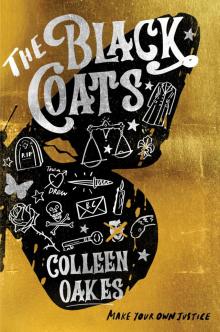 The Black Coats
The Black Coats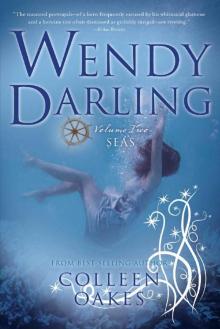 Wendy Darling: Volume 2: Seas
Wendy Darling: Volume 2: Seas Elly in Love (The Elly Series)
Elly in Love (The Elly Series)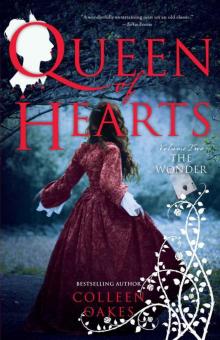 Queen of Hearts: Volume Two: The Wonder
Queen of Hearts: Volume Two: The Wonder Elly In Bloom
Elly In Bloom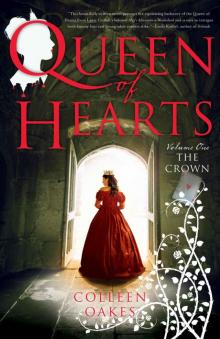 Queen of Hearts (The Crown)
Queen of Hearts (The Crown)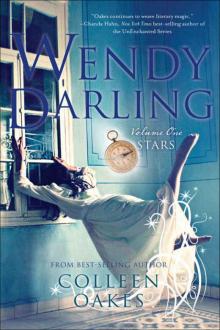 Wendy Darling
Wendy Darling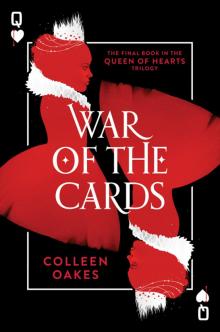 War of the Cards
War of the Cards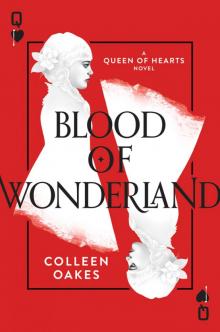 Blood of Wonderland
Blood of Wonderland